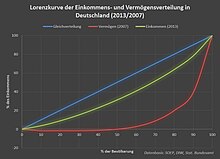Income equity
The income equality is a special form of distributive justice . Income equity considers the question of which income distribution is fair, i.e. which income is fair for a certain person or group of people in a society? The criteria here are usually equality, the special needs of the person, the special achievement of the person or special acquired rights.
Basics
For the eminent American economist Henry George , questions about the distribution of income and wealth are not just economic, but primarily ethical. John A. Ryan saw income equity as the primary issue of distributive justice, namely the question of whether all productive functions are adequately rewarded with the total wages that the individual has received
John Rawls demands that as the incomes of the better off in a society rise, the subsistence level of the needy must rise.
Income equity in Germany
Studies by the Universities of Bielefeld and Konstanz in 2010 showed that over 90% perceive today's social inequalities as too great or far too great . 5.5% consider the social inequality to be just right , 1.4% as too low , 0.6% as much too low and 1.8% could not provide any information. A large majority of respondents (over 80%) expect social inequality to increase over the next ten years, 51% of which will increase sharply. 31% considered their income to be fair , 2.1% as unjustly too high and the rest as unjustly too low (to a greater or lesser extent) . The respondents agree that the current job, personal performance in the workplace and work experience should have the greatest importance for income. Income inequalities are generally perceived as fair, but the low wages are perceived as too low and the top wages as too high.
literature
- Gilbert North: Income Justice. What is meant by this. Vienna / Cologne / Graz 1985.
- Karin Hess / Bettina Temperli Schwarz: The Perception of Income Equity in a Country Comparison, Zurich 2006.
- Frank Dietrich: Dimensions of distributive justice, Stuttgart 2001.
See also
Web links
- Thomas Hinz / Stefan Liebig Report on the study Income Justice in Germany, 2010 (PDF file; 500 kB)
Individual evidence
- ^ Henry George: The Science of Political Economy , New York 2006, p. 352
- ^ John Augustine Ryan: Distributive Justice, 1978 p. 13: productive functions are properly rewarded through the total amount which the individual has received .
- ↑ John Rawls: A theory of justice, Frankfurt / M. 1979, p. 102.
- ↑ http://www.uni-bielefeld.de/soz/haben/liebig/pdf/Studie-Einkommensrechte-2010.pdf p. 5
- ↑ http://www.uni-bielefeld.de/soz/haben/liebig/pdf/Studie-Einkommensrechte-2010.pdf p. 6
- ↑ http://www.uni-bielefeld.de/soz/haben/liebig/pdf/Studie-Einkommensrechte-2010.pdf p. 13
